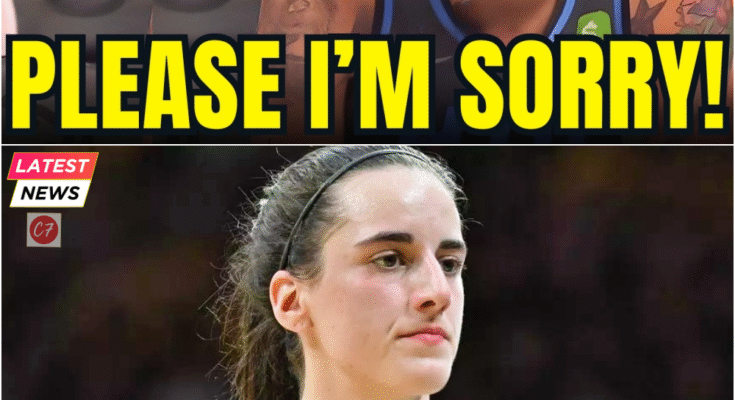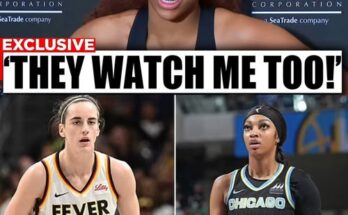She didn’t scream.
She didn’t throw a punch.
She just walked off the court — lips moving. One phrase. No audio.
But what people saw in that single frame changed everything.
Brittney Griner, a veteran, a WNBA champion, two-time Olympic gold medalist, and one of the league’s most visible athletes, appeared to say three words as she passed Caitlin Clark after fouling out in a close game:
“Effing white girl.”
No confirmation. No audio. But the lip-readers across the internet moved quickly — and the video exploded.
It should’ve ended there — a viral moment, a flurry of comments, then forgotten.
But it didn’t.
Because the reaction that came next wasn’t about the phrase. It was about the league. The silence. The nothing.
No statement.
No clarification.
No review.
No accountability.
Just a routine technical fine — $30, the same amount Clark received for a nonverbal reaction earlier in the same game.
Two fines. Equal punishment.
Different actions.
Very different implications.
Let’s be honest. This wasn’t just a heated moment between rivals.
It was the collision of two legacies — and the league blinked.
Griner is a symbol. A survivor. Her return to the league after a harrowing detainment in Russia turned her into a global headline. She’s earned the right to be celebrated.
But that status comes with something else: responsibility.
And Clark?
She’s the phenomenon. The rookie who made the league visible to an entirely new audience. The one who sells out arenas, drives TV ratings, breaks jersey sale records, and changed what WNBA basketball looks like in prime time.
So when the league’s most bankable player gets disrespected on camera by one of its most recognizable veterans — and the league says nothing?
That’s when the questions begin.
What if Clark had said the same thing — with the races reversed?
Would the silence still be this loud?
Would the fine still be this small?
Would people still call it “just trash talk”?
You know the answer.
But here’s the part that makes this story bigger than one moment:
Caitlin Clark didn’t react.
She didn’t complain.
Didn’t tweet.
Didn’t call for action.
Didn’t even look back.
She walked off the court — head up, shoulders square — and carried the weight of it like she always has.
And in that silence, she exposed the truth far louder than any quote could.
Because this isn’t the first time.
She’s been shoved. Elbowed. Body-checked.
Mocked in press conferences. Ignored in highlight reels.
And still — she keeps showing up.
Keeps breaking records.
Keeps packing arenas.
But no matter how much she brings to the game, the response from the league has been consistent:
Minimize. Equalize. Move on.
As if Clark’s presence causes problems just by existing.
As if every confrontation must be mutual.
As if balance matters more than truth.
And fans?
They see it.
Many aren’t even WNBA regulars — they showed up because of Clark.
They bought the tickets, watched the broadcasts, followed the journey.
And now, they’re asking:
“If this is how you treat the reason we’re here, why should we stay?”
The WNBA says it wants to grow.
Says it wants fairness.
Says it wants to protect its players.
But values aren’t tested in press releases.
They’re tested when it’s inconvenient.
When one of your stars is the problem.
When action might upset the wrong person.
And this time, the league chose silence.
It’s not just about Griner.
It’s about what happens next.
What message gets sent — not just to Clark, but to every player, every sponsor, every fan paying attention.
Because the silence doesn’t just fall on Clark’s shoulders.
It casts doubt on the league’s standards as a whole.
Let’s be clear:
Trash talk exists.
Heated moments happen.
Not every offhand word needs a headline.
But when the moment is on camera — clear, viral, and racially charged — and the league pretends not to see?
That’s not discretion.
That’s negligence.
And Clark?
She’s still walking.
Still playing.
Still breaking attendance records while being treated like a distraction.
She’s endured more controversy in two months than some stars face in ten years.
And still — she smiles.
Signs autographs.
Speaks carefully.
Moves like someone who knows she isn’t just playing basketball — she’s playing politics, too.
What’s devastating isn’t what’s been said about her — it’s what’s been tolerated.
Because what would have happened if the roles were reversed?
If Caitlin Clark had looked a Black veteran in the face and said something similar?
There would be statements.
Suspensions.
Outrage — not just from fans, but from every corner of sports media.
Instead, we get:
A fine.
A shrug.
And another game.
So what does this mean for the WNBA?
It means the league is risking the trust of its newest, broadest, and most passionate audience.
It means that corporate sponsors looking for alignment with values like equality and respect — may start looking elsewhere.
It means that the next time Clark gets fouled hard, or mouthed off at, or called out in postgame, more and more fans will start asking:
“How long will she keep carrying this league — if no one’s willing to carry her?”
The WNBA needed this to be a learning moment.
Instead, it became a mirror.
And what fans saw staring back… wasn’t pretty.
As for Clark?
She didn’t demand justice.
Didn’t ask for a microphone.
Didn’t even make eye contact.
She just kept walking — like she always does.
But if you watched closely,
if you listened to the silence,
you heard everything.
Disclaimer:
What follows is a reconstruction based on publicly available footage, audience interpretation, and patterns of response observed across the league. While no official transcript confirms the intent behind what was captured, the emotional resonance and public reaction are unmistakable. This piece does not claim to deliver absolute truth — only to reflect the atmosphere, the silence, and the questions left unanswered. In sports, what isn’t said often speaks loudest. This is one of those moments.



